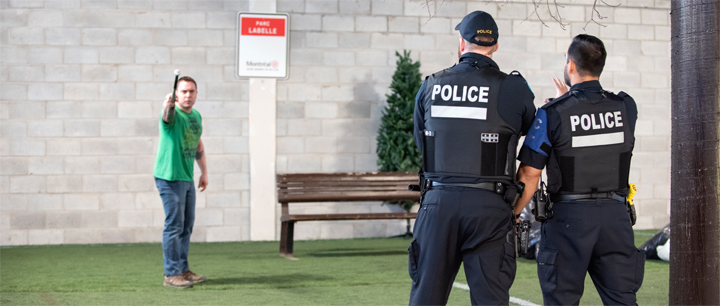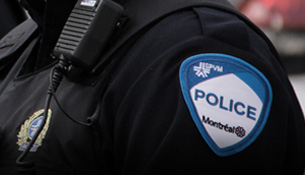RIC (Réponse en intervention de crise) patrol officers
As front-line stakeholders, patrol officers are regularly called upon to intervene with people in crisis. They thus face difficult—if not complex—situations. These events often unfold quickly, and the response time to prevent tragedy is very short.
Based on the model introduced in 2013, the RIC patrol officers are police officers who voluntarily attended a specific four-day training on front-line interventions with people in crisis at risk of violence.

RIC patrol officers act as first responders during their shift. They respond to emergency calls involving people in crisis in order to quickly defuse the situation by way of communication. They support and advise other police officers on the best practices to apply with people in crisis.
For patrol officers, the RIC training increases the probability of reaching a peaceful resolution, thus reducing the risks of injury associated with the use of force, both for people in crisis and police officers. Effective police interventions also have a long-term effect on repeat calls.
Example of a case handled by RIC patrol officers
RIC patrol officers intervene with individuals in crisis. These individuals are significantly unstable; they may be a danger to themselves or others. They may or may not be armed, and they threaten to or may potentially resort to violence.
For instance, the individual in crisis may be an aggressive and suicidal, locked up in his or her apartment, and unwilling to cooperate or to let the police officers in. The RIC patrol officer and his or her colleagues will do anything in their power to defuse the crisis in order to get the individual to leave the apartment on their own to get help. This type of call can often last several hours.
RIC intervention model
This solution is inspired by the Crisis Intervention Team (CIT) police intervention model developed in Memphis,Tennessee,United States, in 1988. This model is commonly referred to as the Memphis Model. Several hundred police departments in the United States and Canada have subsequently adopted this model, or one of its variants, to improve their interventions with individuals who are mentally disturbed or in crisis.
Team
Approximately 300 RIC patrol officers on the neighbourhood police stations’ work teams responding to calls requiring an intervention with someone in crisis.
Since 2019, near 60 patrollers are trained every year as RIC agents in addition to certain specialized sections (detention, Specialized Support and Intervention Section – SIS.
Schedule
RIC patrol officers are mobile. They can quickly get to where they need to be and have the knowledge needed to effectively intervene with people in crisis.
They also act as resource people for their police colleagues for any questions linked to an intervention with a person who is mentally disturbed or in crisis.
Service offering
RIC patrol officers are mobile. They can quickly get to where they need to be and have the knowledge needed to effectively intervene with people in crisis.
They also act as resource people for their police colleagues for any questions linked to an intervention with a person who is mentally disturbed or in crisis.
Number of interventions by RIC patrol officers
The number of interventions by RIC patrol officers cannot be quantified, as their interventions are included in their regular work.
Find out more
Publications
RIC training (Réponse en intervention de crise)
People who are mentally disturbed or in crisis situations
Plan d’action en santé mentale 2015-2020 – Faire ensemble et autrement (In French)
Recognition
In 2015, the RIC received the Mérite Ovation municipale award in the public safety category during the Union des municipalités du Québec congress.
In the media
Santé mentale: le SPVM formera tous ses patrouilleurs d’ici 2022 (In French), La Presse, April 5, 2019
Service de police de la Ville de Montréal – Réponse en intervention de crise (In French), UMQ, 2015
Honorés pour avoir sauvé la vie d’un homme intoxiqué à la cocaïne (In French) - TVA Nouvelles, 22 novembre 2019



